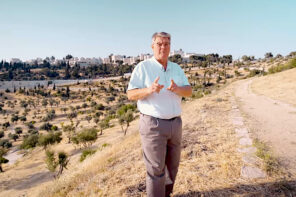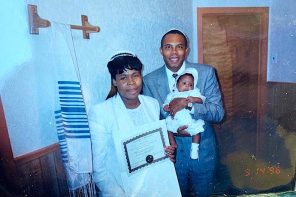Everywhere a Guest, Nowhere at Home: A New Vision of Israel and Palestine
By Kim Chernin
North Atlantic Books, 2009
What if all the Palestinians and all the Israelis who were tired of war decided to move together to some other place? What if, inspired by Neve Shalom/Wahat al-Salam [Oasis of Peace], a call went out across the land to people who wanted to start over again? An enterprise of this kind is possible on a small scale, as we have seen. What if the small scale became a bit larger and moved across borders to a land that is truly without people? I am thinking of the desert—or rather, I am thinking of the desert as Palestinian and Israeli children might imagine it, a place waiting to be brought to life by a pioneering vision. It is a preposterous idea, of course, but is it any more preposterous than Zionism in the 1880s, when the idea of a Jewish state occurred to a handful of oppressed Jewish intellectuals living in the Russian Pale? It has all the advantages of a visionary enterprise; it sends out a call to the dreamers and those who cannot bear the conditions of their life. This time it will not be a state for a particular ethnic or religious group, but for people who sense a kinship of values, who are prepared to work toward a future virtually unthinkable in the present.
Two girls, one Palestinian, one Jewish, are thinking about these things, whispering about them before they fall asleep at night, keeping themselves awake with ideas they have never shared with anyone else, sending notes back and forth when their teachers aren’t looking. Have they invented a child’s form of Arabrew, a language in which secrets are kept? They do not want to be held back by what their teachers and parents think of as reality. They know that the desert can be made to bloom, that cities can be built in hot, windswept, arid settings. They know because these things are happening in their world.
One of their older sisters, who is studying city planning, has been filling their heads with plans she has seen for the creation of a city in the desert. It is called Masdar City, and it is down the road from Abu Dhabi in the United Arab Emirates. It will be a model ecological city, with 80 percent of its water recycled for use; it won’t have cars; it will be run on power that comes from the sun. The water used for the crops will be collected underground and used all over again. Even the waste will be 100 percent recycled. This is not a dream for the future. Older sister has told them that it is already happening; the site has been selected and the building has begun.
The girls are less impressed than she has expected. They already know that the desert is just dry land waiting for water. They’ve heard of taking the salt out of seawater and diverting water from the Nile and bringing in water from a distance with pipes. They know the important thing is to get the fundamental ideas right and then let the details fall into place by themselves. They have both been to Neve Shalom/Wahat al-Salam. They have heard its story, and they are convinced you can make anything happen if you believe in it, if you take small steps and work hard.
Some of the problems their parents fret over do not seem troublesome to them. They have been friends since childhood, sleeping over at each other’s homes, hanging out in the two different family circles. They take for granted that Arabs and Jews can live together. The Israeli girl has been listening to the grandmother of her Palestinian friend talk about the village where she grew up. The old woman remembers their orchards and how the small children ran out every morning to see if the fruit was ripe. When she was little, grandmother could recognize from a distance the ripest fruit and get there first before anyone could stop her. She remembers the names of all her neighbors, of every person in the village and where they lived and how far the apple trees were from the houses.
From this, the Israeli girl has decided that in their new world, people will build small villages. She knows the Palestinians are master builders, and she thinks it will be good for the Jews to work with their hands. Her Palestinian friend likes the stories she’s heard about the early kibbutzim, especially the one where the Jewish grandmother lived. It belonged to a socialist movement, Hashomer Hatzair. The people there believed in egalitarianism between women and men and had always argued for the existence of a binational state. The disagreement between the girls about whether they should build villages or collective farms has been their first disagreement, easily enough resolved when it occurs to them that they can have both types of settlement; they can be each other’s near neighbors and sleep over at each other’s house. Neither of them wants to live in a big city, not even a city with solar power and recycled water. If cities have to be built for the people who want them they will leave that to older sister.
Where would their settlements be built? Obviously, in the Sinai. Lots of land, no people, people looking for a land. They have been told that Masdar City, with its narrow streets and shaded walks, is the pet project of an Arab sheik from the United Arab Emirates. He wants to do something he can really believe in. Maybe he has an older daughter who will want to make a contribution to peace in the Middle East? A few girls a little older than they are, from two or three oil-rich families, or maybe just from one rich family, can finance the project.
The second cousin of the Jewish girl, who lives in New York, has come to Israel for his bar mitzvah. Everyone knows that when his grandfather dies he is going to inherit a lot of money. Both girls have been up late whispering with him. When other people hear about their project they will contribute. The girls know the formula: start small, work hard, be true to your vision and help will come. No profit is going to be made, no agencies will be involved, the organizations they need will form from the ground up. A just system of distribution of wealth will be found, and when they have problems they will all go together to Neve Shalom/Wahat al-Salam. Or maybe they will become their own Neve Shalom/Wahat al-Salam, another center where schoolchildren and older people can come to learn about conflict resolution and listening to one another. They think the children should all live together away from their parents; that way, if they want to stay up all night talking and making plans, there will be no one to interfere.
Who would want to go live in the New Sinai? It will be people whose homeland doesn’t have to be something promised to them or even a place they think of as holy; people who are able to put aside their grief and pain over what has been taken from them. People who want to leave the bombings and curfews and checkpoints and identity cards and soldiers breaking into their houses any time of day or night, leave it all to anyone who wants to go on fighting over who came first and who has rights and who has suffered more, and who is more violent, and who has killed more of the other people. People who want to leave the whole mess behind because they want to start all over again, together.
One of these days they are going to write the whole thing up and read it to their class and find out if there is anyone who wants to join them. No one is going to listen to what their teachers have to say, or their parents, or the people who write books and articles in the newspaper and can’t think of anything except the same old things nobody believes in. Peace conferences in Madrid, declarations of principles, Cairo agreements, Washington agreements, road maps. One of these days they will let everyone know what they are planning, and then all the children and older sisters and brothers who want to join them and any parents who think they will fit in and the grandmothers who won’t have to walk, they can come along in cars and buses, will travel to every village and camp and city and small town and kibbutz and moshav and to the prisons and the hospitals and the schools and universities to spread the word.
Right now they are still whispering and passing notes in their own secret bilingual language, but all they have to do is stay friends and keep believing it can happen and grow up a little and the time will come. The story has just begun.
From Everywhere a Guest, Nowhere at Home: A New Vision of Israel and Palestine by Kim Chernin, published by North Atlantic Books, copyright © 2009 by Kim Chernin. Reprinted by permission of publisher.




